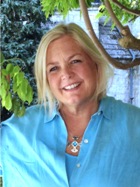July 10, 2016
When Joanne Martindale’s phone rang one morning, she couldn’t have imagined the reason for the call.
At the time, she was a student at San Francisco Theological Seminary; a single mother of two boys, ages five and six; the director of chaplaincy at Ancora Psychiatric Hospital in Hammonton, New Jersey, and a chaplain in the New Jersey Army National Guard. She had been practicing ministry since 1988.
The voice on the other end was her commanding officer, calling her into a job that would end up lasting for months, taking her to landscapes not covered on any maps. He told her, “Leave your civilian job, go home and put on your dress blues and report for duty.”
The date was September 11, 2001.
Martindale, along with all the other chaplains and chaplain assistants from the New Jersey and New York National Guard, ministered in the devastation of ground zero and the nearby Fresh Kills landfill on Staten Island. Every chaplain was given an assignment according to their expertise and experience. “My expert areas in the military include loss support groups and reading body language,” Martindale said. “Half the chaplains were told to report to ground zero for duty, and the other half were told to report at the landfill.”
Her job as chaplain was to study the behavior of workers responding to the deaths and devastation and to see when it was time for them to be pulled off the line. “Were they getting stressed? Were they overcome with grief? How much longer could they work? These were the questions I asked myself as I watched and assessed,” Martindale said. She observed FEMA workers, firefighters, National Guard soldiers, and mortuary affairs personnel, to name a few. “I was given permission to pull them off the line if I thought their behavior was getting near the ‘danger zone’ of grief and burnout.”
At the landfill were huge tents where workers sorted and tagged every item that came to them—bolts, shoes, wedding rings, body parts. Martindale recalled, “One afternoon I walked up to a man who was sawing off the top of a car. When he pulled off the top, he found a child seat and little girl’s doll. When he saw the doll, he hit his limit and threw his saw with superhuman strength. He swore and said, ‘What the hell is this world coming to when little girls are killed? I can’t handle this s¬¬___!’” With that he walked away, swearing.
“I followed him quietly from behind. He said, ‘I see you there, Chaplain, but I’m not going to talk with you!’ I said, ‘That makes sense to me; there are no words to say after what you saw.’ We walked three miles around the landfill before he said anything. I noticed he was walking slower, the cussing had stopped and the anger subsided. He said, ‘Last year my daughter died. My wife left me. Why is there so much pain in the world? I don’t get it, Chaplain!’”
Martindale didn’t offer him platitudes or certainties, because for him that day, there were none. She provided a pastoral presence, a listening ear, a nonjudgmental attitude and care.
Chaplain Martindale later became one of only three female Army Reserve chaplains in the United States to achieve the rank of colonel.
Judy Zimola, Communications Manager, San Francisco Theological Seminary
Let us join in prayer for:
PC(USA) Agencies’ Staff
Jeffrey Arnold, APCU
SanDawna Ashley, OGA
Let us pray
Holy God, you work through us in incredible, mysterious and sometimes uncomfortable ways. Lead us out where we are needed. Help us to go forth unafraid. Empower us to point people to you. Amen.
Daily Lectionary
Morning Psalms 103; 150
First Reading Joshua 1:1-18
Second Reading Acts 21:3-15
Gospel Reading Mark 1:21-27
Evening Psalms 117; 139
